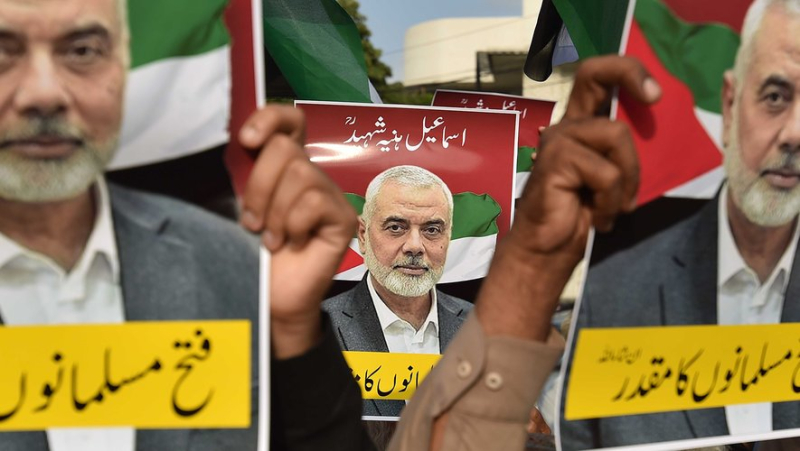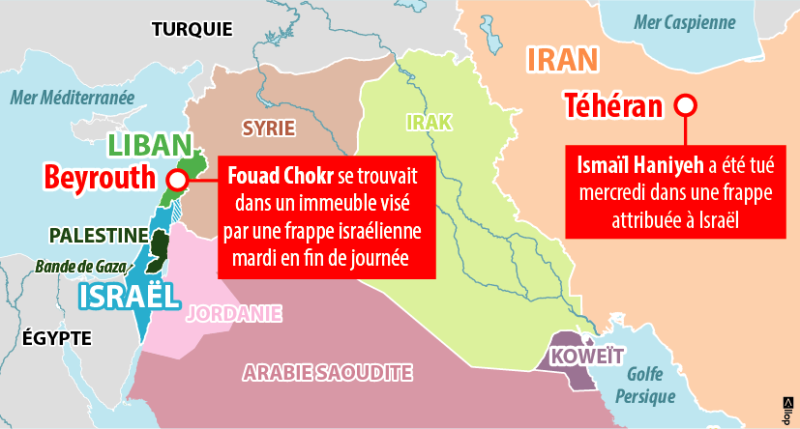Assassination of Hamas leader in Iran: what can we expect now, analysis with expert Bertrand Badie

Ismaïl Haniyeh, le leader du Hamas tué, mercredi, en Iran. EPA – SHAHZAIB AKBER
Entretien avec Bertrand Badie, professeur émérite à Sciences Po Paris, l’un des spécialistes en relations internationales les plus influents, auteur notamment de l’ouvrage "Pour une approche subjective des relations internationales", publié chez Odile-Jacob.
What is your reading of these two operations attributed to Israel, the one that killed the leader of Hamas in Tehran on Wednesday morning, a few hours after a strike that targeted a Hezbollah commander in Beirut?
I think that we should not link the two operations too firmly; they are similar and are part of a perspective of hardening and widening of the conflict, but they obey two different logics. The increasingly heated confrontation between the Israeli government and Hezbollah has its own rationale, the one that has opposed it to Hamas since October 7 has another.
What risks, and by far, having the most consequences is of course the operation in Tehran, it was announced, but it remains highly illogical, at least for three reasons.
The first is that Ismail Haniyeh led the political faction of Hamas, while It is the armed branch that is considered to be the instigator of the attacks of October 7.
The second is that Ismail Haniyeh was, of all the Hamas leaders, the one who had the strongest popularity among the Palestinian population, the emotion that this action will create will therefore radicalize his mobilization by strengthening his solidarity with this movement.

Click to enlarge ALLop
The third reason is the location of the operation, in Iran, this could create an extremely dangerous escalation. This is all the more absurd as it was done on the occasion of the inauguration of a new president presented as less conservative than his predecessor. This could give a bonus to the most conservative and extreme factions of the Iranian regime.
All this will only have negative effects on the future of peace in the region, particularly once again on the unfortunate hostages who risk paying the highest price. It is hard to see Hamas negotiating under these conditions.
This is a real snub for Tehran. What can be its response and that of Hezbollah after the attack on Beirut??
Iran has no interest in widening the conflict and taking an initiative that would make the situation totally irreversible, but it cannot not react. We must expect a significant, spectacular and at least symbolic action.
Hezbollah will also lose its credibility if it does not react, but it has no interest in a generalized war either, too strong a response would risk endangering its leadership in the Lebanese political system,

Bertrand Badie DR – Pauline Le Goff
What could be the impact for Hamas and its reaction ?
This event may paradoxically strengthen it. For nine months, it has been said that Hamas is on the way to being eradicated, not only has there never been any proof, but its popularity tends to grow stronger within the Palestinian population.
We can expect some strong and also symbolic actions, but Hamas' strategy is no longer military, its priority is to consolidate its positions within the population. The disappearance of Haniyeh will strengthen the military branch and its leadership over the Hamas movement in general.
After this turning point, can we expect an escalation, a flare-up in the region ? What could be the repercussions throughout the world ?
I am not sure that we will see a drastic change, but a worsening of the situation.
Overall, the events we have been witnessing since October 7, given the ambiguous attitude of the Western powers, are reinforcing the global South in its unitary consciousness, in the idea of double standards.
This also risks bringing the global South a little closer to Russia, or even to other northern powers, and isolating the Western powers. If there is no strong reaction from the Western states, we risk seeing the international system transform in this direction.
It will therefore be interesting to follow the statements of the new American Democratic candidate Kamala Harris, who seems to have become aware of this danger and to see, in the event that she is elected, whether the United States will be able to clearly change its position in this conflict.
For the moment there are only rhetorical developments, but there is no real change in the position of the United States.
Behind the military objectives displayed by Benyamin Netanyahu, what is his calculation? politics ?
He considers that the continuation and deepening of the war also serves his individual strategy, insofar as he wants to escape justice and that the end of a conflict should also lead to reshuffling the electoral cards in the country, which will not be favorable to him.
But his strategic line which does not rely on power and on the indentarization of this war to present it as a conflict between cultures, between civilization against barbarism, leads to an impasse.
I subscribe to read more




